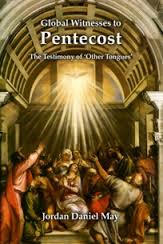 Jordan Daniel May, Global Witness to Pentecost: The Testimony of ‘Other Tongues’ (Cleveland, TN: Cherohala Press, 2013). $12.95, 152 pages. Paperback / Kindle
Jordan Daniel May, Global Witness to Pentecost: The Testimony of ‘Other Tongues’ (Cleveland, TN: Cherohala Press, 2013). $12.95, 152 pages. Paperback / Kindle
One of the hallmarks of Pentecostalism is speaking in tongues, a practice first recorded in Acts 2:4: “All of them [i.e., the disciples of Jesus] were filled with the Holy Spirit and began to speak in other tongues as the Spirit enabled them” (NIV). In Greek, the word translated “tongues” is glossais. The NIV marginal note lists “languages” as an alternative translation. In Acts 2:6, Luke notes that the crowd “heard their own language being spoken,” where “language” translates the Greek word dialekto, from which we get the word dialect. A few verses later, members of the crowd say, “we hear them declaring the wonders of God in our own tongues” (2:11), where “tongues” once again translates glossais. Given that “tongues” and “languages” are used synonymously here, the correct assumption is that on the Day of Pentecost, the disciples spoke human languages unknown to them but known to their hearers.
Obviously, such as practice is miraculous in character. Moreover, linguists who have studied contemporary glossolalia have described it as “only a façade of language,” in William J. Samarin’s description. Thus, we come to a dilemma: One horn is the precedent of Pentecost, where disciples of Jesus miraculously spoke known human languages. The other horn is linguistic evidence that much contemporary glossolalia is not any known human language.
Traditionally, Pentecostals have resolved this dilemma in two ways: First, they argue that much contemporary glossolalia is a “heavenly language,” what Paul called “the tongues…of angels” in 1 Corinthians 13:1. Second, they argue that contemporary Pentecostals do in fact occasionally speak in human languages they have not learned.
Global Witness to Pentecost by Jordan Daniel May compiles 88 testimonies where persons have spoken in tongues or have witnessed someone else speaking in tongues where the tongue is a known human language. (If you include an incident mentioned in the Foreword, the book includes an 89th testimony.)
The author describes his methodology this way: “I attempted to verify each testimony with more than one witness (when feasible). It was my desire to have as many sources per testimony as possible… Those testimonies I was able to verify, I included. If I was unable to confirm a testimony, then it was eliminated. Put plainly, if I had a doubt, I left it out. In the end, I can honestly say I did my best to verify each story” (p. xiii).
He goes on to note that “no amount of documentation will satisfy a critic” (p. xiii). So, a skeptic of Pentecostalism—whether an atheist who denies the miraculous or a Christian cessationist who denies that miracles happen today—will find nits to pick in these testimonies. As a Pentecostal, however, I view these testimonies as eyewitness accounts. Given that I personally know three individuals who report such miracles—George O. Wood (pp. xi, 97), Joseph Castleberry (p. 16), and Byron Klaus (pp. 69, 103)—I am inclined to credit their reports. The author’s reports are drawn largely from the Assemblies of God and from the last five decades. It would be a valuable research project to compile more such testimonies (perhaps online), from both historical and contemporary sources, for further study.
Full Disclosure: I am the son of George O. Wood, mentioned above, who wrote the Foreword to Global Witness to Pentecost.
P.S. If you found my review helpful, please vote “Yes” on my Amazon.com review page.

